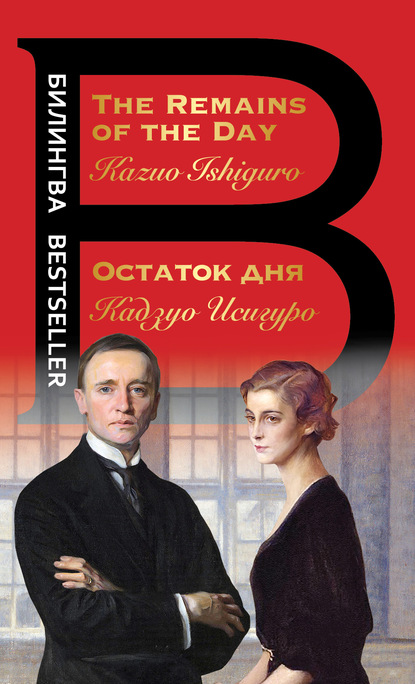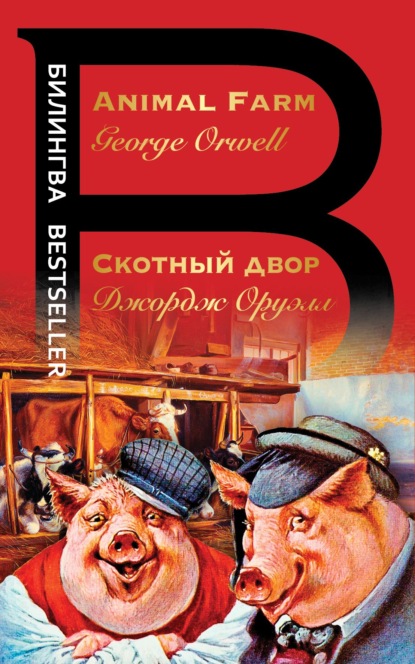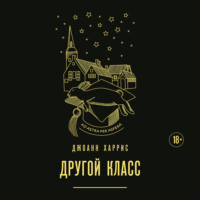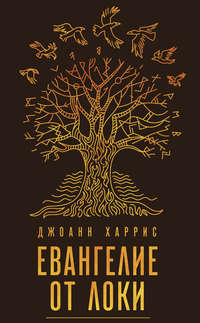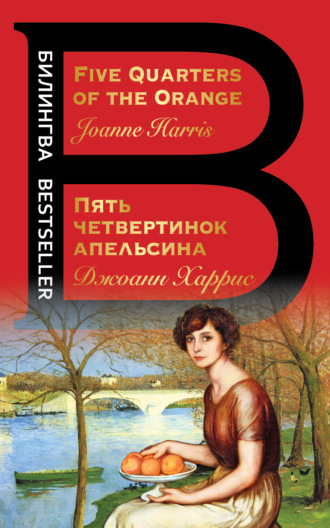
Полная версия
Five Quarters of the Orange / Пять четвертинок апельсина
This was a long speech for Paul, and in spite of myself I listened with interest. The river abounded with stories and old wives’ tales, but the story of Old Mother was the most enduring. The giant pike, her lip pierced and bristling with the hooks of anglers who had tried to catch her. In her eye, an evil intelligence. In her belly, a treasure of unknown origin and inestimable worth.
“My dad sez that if anyone was to catch her, she’d hafta give you a wish,” said Paul. “Sez he’d settle for a million francs and a look at that Greta Garbo’s underwear.”
He grinned sheepishly. That’s grownups for you, his smile seemed to say.
I considered this. I told myself I didn’t believe in curses or wishes for free. But the image of the old pike wouldn’t let go.
“If she’s there, we could catch her,” I told him abruptly. “It’s our river. We could.”
It was suddenly clear to me; not only possible, but an obligation. I thought of the dreams that had plagued me ever since Father died; dreams of drowning, of rolling blind in the black surf of the swollen Loire with the clammy feel of dead flesh all around me, of screaming and feeling my scream forced back into my throat, of drowning in myself. Somehow the pike personified all that, and though my thinking was certainly not as analytical as that, something in me was suddenly certain-certain-that if I were to catch Old Mother, something might happen. What it might be I would not articulate even to myself. But something, I thought in mounting, incomprehensible excitement. Something.
Paul looked at me in bewilderment.
“Catch her?” he repeated. “What for?”
“It’s our river,” I said stubbornly. “It shouldn’t be in our river.”
What I wanted to say was that the pike offended me in some secret, visceral way, much more so than the snakes: its slyness, its age, its evil complacency. But I could think of no way to say it. It was a monster.
“‘Sides, you’d never do it,” Paul went on. “I mean, people have tried. Grownup people. With lines and nets an’ all. It bites through the nets. And the lines… it breaks them right snap down the middle. It’s strong, see. Stronger than either of us.”
“Doesn’t have to be,” I insisted. “We could trap it.”
“You’d hafta be bloody clever to trap Old Mother,” said Paul stolidly.
“So?” I was beginning to be angry now, and I faced him with fists and face both clenched in frustration. “So we’ll be clever. Cassis and me and Reinette and you. All four of us. Unless you’re scared.”
“I’m not’s-scared, but it’s im-im-impossible.”
He was stuttering again, as he always did when he felt under pressure.
I looked at him.
“Well, I’ll do it on my own if you won’t help. And I’ll catch the old pike too. You just wait.”
For some reason my eyes were stinging. I wiped them furtively with the heel of my hand. I could see Paul watching me with a curious expression, but he said nothing. Viciously, I poked at the hot shallows with my net.
“‘S only an old fish,” I said. Poke. “I’ll get it and I’ll hang it on the Standing Stones.” Poke. “Right there.” I pointed at the Treasure Stone with my dripping net. “Right there,” I said again in a low voice, spitting on the ground to prove that what I said was true.
2
My mother smelt oranges all through that hot month. As often as once a week, though it was not every time that a bad spell ensued. While Cassis and Reinette were at school I ran to the river, mostly on my own but sometimes accompanied by Paul, when he could get away from his chores on the farm.
I had reached an awkward age, and separated from my siblings for most of those long days I grew bold and defiant, running away when my mother gave me work to do, missing meals and coming home late and dirty, my clothes streaked yellow with riverbank dust, hair untied and plastered back with sweat. I must have been born confrontational, but that summer I grew more so than I had ever been. My mother and I stalked each other like cats staking out their territory. Every touch was a spark that hissed with static. Every word was a potential insult, every conversation a minefield. At mealtimes we sat face-to-face, glowering over our soup and pancakes. Cassis and Reine flanked us like frightened courtiers, big-eyed and silent.
I don’t know why we pitted ourselves against each other; maybe it was the simple fact that I was growing up. The woman who had terrified me during my infancy now took on a different light. I could see the gray in her hair, the lines bracketing her mouth. I could see now – with a flash of contempt – that she was only an aging woman whose bad spells sent her helpless to her room.
And she baited me. Deliberately-or so I thought. Now I think that maybe she couldn’t help it, that it was as much in her unhappy nature to bait me as it was in mine to defy her. It seemed during that summer that every time she opened her mouth it was to criticize. My manners, my dress, my appearance, my opinions. Everything, according to her, was reprehensible. I was slovenly: I left my clothes unfolded at the foot of my bed when I went to sleep. I slouched when I walked: I would become a hunchback if I wasn’t careful. I was greedy, stuffing myself with fruit from the orchard. Otherwise I had little appetite: I was growing thin, scrawny. Why couldn’t I be more like Reine-Claude? At twelve, my sister had already ripened. Soft and sweet as dark honey, with amber eyes and autumn hair, she was every storybook heroine, every screen goddess I had ever imagined and admired. When we were younger she would let me plait her hair, and I would twist flowers and berries into the thick strands and circle her head with convolvulus so that she looked like a woodland sprite. Now there was something almost adult about her composure, her passive sweetness. Next to her I looked like a frog, my mother told me, an ugly skinny little frog with my wide sullen mouth and my big hands and feet.
I remember one of those dinnertime conflicts in particular. I remember we had paupiettes, those little parcels of veal and minced pork tied with string and cooked in a thick stew of carrots, shallots, tomatoes in white wine. I looked into my plate with sullen disinterest. Reinette and Cassis looked at nothing, carefully detached.
My mother clenched her fists, infuriated by my silence. After my father’s death there was no one to temper her rage, and it was always close by, boiling under the surface. She seldom struck us-very unusual in those days, almost a freak-though it was not, I suspect, from any great sense of affection. Rather, she was afraid that, having begun, she might not be able to stop.
“Don’t slouch, for God’s sake.” Her voice was tart as an unripe gooseberry. “You know that if you slouch, you’ll end up staying that way.”
I gave her a quick, insolent look and put my elbows on the table.
“Elbows off the table!” she almost moaned. “Look at your sister. Look at her. Does she slouch? Does she behave like a sulky farmhand?”
It did not occur to me to resent Reinette. It was my mother I resented, and I showed it with every movement of my sly young body. I gave her every excuse to hound me. She wanted the clothes on the washing line hung by the hems: I hung them by the collars. The jars in the pantry had to have the labels facing the front: I turned them backward. I forgot to wash my hands before meals. I changed the order of the pans hanging on the kitchen wall, largest to smallest. I left the kitchen window open so that when she opened the door the draft would make it bang. I infringed a thousand of her personal rules, and she reacted to each trespass with the same bewildered rage. To her, those petty rules mattered because those were the things she used to control our world. Take them away and she was like the rest of us, orphaned and lost.
Of course, I didn’t know that then.
“You’re a hard little bitch, aren’t you?” she said at last, pushing away her plate. “Hard as nails.” There was neither hostility nor affection in her voice, merely a kind of cool disinterest. “I used to be like that,” she said. It was the first time I had ever heard her speak of her own childhood. “At your age.”
Her smile was stretched and mirthless. Impossible to imagine her ever being young. I stabbed at my paupiette in its congealing sauce.
“I always wanted to fight everybody too,” said my mother. “I would have sacrificed everything, hurt anyone to prove myself right. To win.” She looked at me intently, curiously, her black eyes like pinpricks in tar. “Contrary, that’s what you are. I knew from the moment you were born that’s what you were going to be. You started it all again, worse than ever. The way you screamed in the night and wouldn’t feed-and me lying awake with the doors closed and my head pounding.”
I did not answer. After a moment my mother laughed rather jeeringly and began to clear the dishes. It was the last time she spoke of the war between us, though that war was far from over.
3
The Lookout Post was a large elm on the near bank of the Loire. Half overhanging the water, a clutch of thick roots hanging down deep from the dry soil of the bank, it was easy to climb even for me, and from the higher branches I could see all of Les Laveuses. Cassis and Paul had built a primitive tree house there – a platform and some branches bent over to make a roof – but I was the one who spent the most time in the completed shelter. Reinette was reluctant to climb to the top, though the way had been made easier by means of a knotted rope, and Cassis rarely went there any more, so I often had the place to myself. I went there to think and to watch the road, where sometimes I could see the Germans in their jeeps-or more often, motorcycles-passing by.
Of course, there was little to interest the Germans in Les Laveuses. There were no barracks, no school, no public buildings for them to occupy. They settled in Angers instead, with only a few patrols around the neighboring villages, and all I saw of them – except for the vehicles on the road – were the groups of soldiers sent every week to requisition produce from the Hourias farm. Our own was less frequented: we had no cows, only a few pigs and goats. Our main source of income was fruit, and the season had barely begun. A couple of soldiers came, halfheartedly, once a month, but the best of our supplies were well hidden, and Mother always sent me out into the orchard when the soldiers came. Even so I was curious about the gray uniforms, sometimes sitting in the Lookout Post and shooting imaginary rockets at the jeeps as they sped by. I was not truly hostile – none of the children were. We were merely curious, repeating the insults our parents taught us – filthy Boche, Nazi swine – out of an instinct for mimicry. I had no idea of what was happening in occupied France; little enough notion of where Berlin even was.
Once they had come to requisition a violin from Denis Gaudin, Jeannette’s grandfather. Jeannette told me about it just a week before she died. It was getting dark and the blackout shutters were already in place, when she heard a knocking at the door. She opened it and saw a German officer. In polite though laborious French he addressed her grandfather.
“Monsieur, I… understand… you have… a violin. I… need it.”
A few of the officers, it seemed, had decided to form a military band. I suppose even Germans needed some way of passing the time.
Old Denis Gaudin looked at him.
“A violin, mein Herr, is like a woman,” he replied pleasantly. “Not to be lent out.”
And very gently he closed the door. There was a silence as the officer digested this. Jeannette looked up at her grandfather with wide eyes. Then, outside, the sound of the German officer laughing and repeating:
“Wie eine Frau! Wie eine Frau!”
The German officer never came back, and Denis kept his violin until much later, almost until the end of the war.
4
For a time that summer, however, my main interest was not the Germans. I spent most of my waking hours-and many of my sleeping-devising ways of trapping Old Mother. I studied the various techniques of fishing. Line for eels, pots for crays, dragnets, straight nets, live bait and skim lures. I went to Jean-Marc Hourias and plagued him until he had told me all he knew about bait. I dug bloodworms from the sides of the banks and learned to keep them in my mouth for warmth. I trapped bluebottles and threaded them on lines bristling with fishhooks like strange tinsel. I made traps from cages of willow and thread, baited with scraps. A single touch on one of the threads in the cage and it would spring shut, jerking the whole contraption out of the water as the bent branch underneath it was released. I stretched pieces of net across the narrower channels between the sandbanks. I left static lines baited with boluses of rotting meat hanging from the far bank. In this way I caught any number of perch, small bleaks, gudgeons, minnows and eels. Some I took home to eat and watched my mother prepare them. The kitchen was the now only neutral place in the house, a place of brief respite from our private war. I used to stand beside her, listening to her low monotone, and together we made her bouillabaisse angevine, the fish stew with red onions and thyme, and perch roasted in tinfoil with tarragon and wild mushrooms. Some of my catches I left at the Standing Stones in gaudy, stinking garlands: a warning and a challenge.
But Old Mother did not come. On Sundays, when Reine and Cassis were home from school, I would try to infuse them with my passion for the hunt. But since Reine-Claude’s admission to the collège earlier that year the two of them had become a race apart. Five years separated me from Cassis. From Reine, three. And yet they seemed closer than two years to each other, gilded with adulthood, so alike with their golden faces and high cheekbones that they might almost have been twins. They often talked together in secret whispers, secret laughter, naming friends I had never heard of, laughing at private jokes. Alien names punctuated their conversations. Monsieur Toupet. Madame Froussine. Mademoiselle Culourd. Cassis had nicknames for all his teachers and could mimic their habits, their voices to make Reine laugh. Other names, whispered under cover of darkness when I was asleep, seemed to be those of their friends. Heinemann. Leibniz. Schwartz. Laughter when these names were whispered, strange, spiteful laughter with a bright note of guilt and hysteria. They were names I did not recognize, foreign names, and when I asked about them, Cassis and Reine-Claude simply giggled and ran away, arm in arm, toward the orchard.
This elusiveness troubled me more than I could have imagined. They had become conspirators where before they were my equals. Suddenly all our shared activities had become childish to them. The Lookout Post, the Standing Stones, were mine alone. Reine-Claude claimed to be afraid to go fishing for fear of snakes. Instead she stayed in her room, brushing her hair into complicated styles and sighing over photographs of film actresses. Cassis listened with polite inattention to my excited plans, then made excuses to leave me on my own. A lesson to copy. Latin verbs to learn for Monsieur Toubon. I’d understand later, when I was older. They made every effort to keep me away from them. They made appointments with me that they did not keep, sending me across Les Laveuses on an imaginary errand, promising to meet me at the river then making for the forest alone, while I waited, angry tears burning my eyes. They pretended innocence when I challenged them, clapping sly hands to their mouths-Did we really say the big elm? I was so sure we agreed the second oak-and giggling when I stalked away.
They only went occasionally to the river to swim, Reine-Claude entering the water gingerly, and only in the deeper, clearer parts where snakes were unlikely to venture. I sought their attention, making extravagant dives from the bank and swimming underwater for such long stretches that Reine-Claude would scream that I was drowned. Even so I felt them slipping from me little by little, and loneliness overwhelmed me.
Only Paul stayed loyal during this time. Though he was older than Reine-Claude and almost the same age as Cassis, he seemed younger, less sophisticated. He was inarticulate when they were there, smiling in agonized embarrassment when they talked about school. Paul could barely read, and his writing was the stilted, painful printing of a much younger child. He liked stories, though, and I would read to him from Cassis’s magazines when he came to the Lookout Post. We used to sit on the platform, he whittling at a piece of wood with his small knife while I read The Mummy’s Tomb or The Martian Invasion, half a loaf of bread on the board between us, from which we would occasionally cut a slice. Sometimes he brought a piece of rillettes wrapped in a sheet of waxed paper, or half a camembert. To our little feast, I would add a pocketful of strawberries or one of the goat’s cheeses rolled in ash that my mother called petits cendrés. From the Post I could see all my nets and traps, which I checked every hour, resetting them as necessary and removing the small fry.
“What’ll you wish for when you catch her?”
By now he believed implicitly that I would catch the old pike, and he spoke with a kind of reluctant awe.
I considered.
“Dunno.” I took a bite of bread and rillettes. “There’s no point making plans till I’ve caught it. That might take time.”
It was time I was willing to take. Three weeks into June and my enthusiasm had not faltered. Quite the opposite. Even the indifference of Cassis and Reine-Claude only served to increase my stubbornness. Old Mother was a talisman in my mind, a slinking black talisman that, if I could only reach it, might put right everything which was skewed.
I’d show them. The day I caught Old Mother they’d all look at me in amazement. Cassis, Reine-and to see that look in my mother’s face, to make her see me, perhaps to clench her fists in rage… Or to smile with peculiar sweetness and open her arms…
But here my fantasy stopped; I dared not imagine further.
“‘Sides,” I said with studied languor. “I don’t believe in wishes. I told you that already.”
Paul looked cynical.
“If you don’t believe in wishes,” he pointed out, “then what’re you doing it for at all?”
I shook my head.
“Dunno,” I said at last. “Just for something to do, I expect.”
He laughed.
“That’s you, Boise,” he said between gusts of laughter. “That’s you all over, that is. Catch Old Mother for something to do!”
And he was off again, rolling alarmingly close to the edge of the platform in his incomprehensible hilarity until Malabar, tied with string at the foot of the tree, began to bark sharply and we fell silent before our cover was blown.
5
Soon after that, I found the lipstick under Reine-Claude’s mattress. A stupid place to hide it, really-anyone could have found it, even Mother-but Reinette was never imaginative. It was my turn to make the beds, and the thing must have worked its way under the bottom sheet, because that was where I found it, tucked between the lip of the mattress and the bedboard. At first I didn’t recognize it. Mother never used makeup. A small golden cylinder, like a stubby pen. I turned the cap, encountered resistance, opened. I was experimenting rather gingerly on my arm when I heard a gasp behind me and Reinette jerked me round. Her face was pale and contorted.
“Give me that!” she hissed. “That’s mine!”
She snatched the lipstick from my fingers and it fell to the floor, rolling under the bed. Quickly she scrabbled to retrieve it, her face flaring.
“Where did you get that?” I asked curiously. “Does Mother know you’ve got it?”
“None of your business,“ gasped Reinette, emerging from under the bed. ”You’ve no right to go snooping in my private things. And if you dare tell anyone-“
I grinned. “I might tell,” I told her. “And I might not. It just depends.”
She took a step forward, but I was almost as tall as she was, and though rage had made her reckless, she knew better than to try to fight me.
“Don’t tell,” she said in a wheedling voice. “I’ll go fishing with you this afternoon, if you like. We could go to the Lookout Post and read magazines.”
I shrugged. “Maybe. Where did you get it?”
Reinette looked at me.
“Promise you won’t tell.”
“I promise.”
I spat in my hand. After a moment’s hesitation she followed suit. We sealed the bargain with a spit-clammy handshake.
“All right.” She sat down on the edge of the bed, legs curled underneath her. “It was at school. In spring. We had a Latin teacher there, Monsieur Toubon. Cassis calls him Monsieur Toupet because he looks as if he wears a wig. He was always getting at us. He was the one who made the whole class stay in that time. Everybody hated him.”
“A teacher gave it to you?” I was incredulous.
“No, stupid. Listen. You know the Boches requisitioned the lower and middle corridors and the rooms around the courtyard. You know, for their quarters. And their drilling.”
I’d heard this before. The old school, with its location near the center of Angers, its large classrooms and enclosed playgrounds, was ideal for their purposes. Cassis had told us about the Germans on maneuvers with their gray cow’s-head masks, how no one was allowed to watch and the shutters had to be closed around the courtyard at those times.
“Some of us used to creep in and watch them through a slit under one of the shutters,” said Reinette. “It was boring, really. Just a lot of marching up and down and shouting in German. Can’t see why it all has to be so secret.” Her mouth drooped in a moue of dissatisfaction. “Anyway, old Toupet caught us at it one day,” she continued. “Gave us all a big lecture, Cassis and me and… oh, people you wouldn’t know. Made us miss our free Thursday afternoon. Gave us a whole lot of extra Latin to do.” Her mouth twisted viciously. “I don’t know what makes him so holy anyhow. He was only coming to watch the Boches himself.” Reinette shrugged. “Anyway”-she continued in a lighter voice-“we managed to get him back eventually. Old Toupet lives in the collège-he has rooms next to the boys’ dorm-and Cassis looked in one day when Toupet was out, and what do you think?”
I shrugged.
“He had a big radio in there, pushed under his bed. One of those long-wave contraptions.”
Reinette paused, looking suddenly uneasy.
“So?”
I looked at the little gold stick between her fingers, trying to see the connection.
She smiled, an unpleasantly adult smile.
“I know we’re not supposed to have anything to do with the Boches. But you can’t avoid people all the time,” she said in a superior tone. “I mean, you see them at the gate, or going into Angers to the pictures…”
This was aprivilege I greatly envied Reine-Claude and Cassis-that on Thursdays they were allowed to cycle into the town center to the cinema or the café-and I pulled a face.
“Get on with it,” I said.
“I am,” complained Reinette. “God, Boise, you’re so impatient…” She touched her hair. “As I was saying, you’re bound to see Germans some of the time. And they’re not all bad.” That smile again. “Some of them can be quite nice. Nicer than old Toupet, anyway.”
I shrugged indifferently.
“So one of them gave you the lipstick,” I said with scorn.
Such a fuss over so little, I thought to myself. It was just like Reinette to get so excited about nothing at all.
“We told them-well, we just mentioned to one of them-about Toupet and his radio,” she said. For some reason she was flushed, her cheeks bright as peonies. “He gave us the lipstick, and some cigarettes for Cassis, and… well, all kinds of things.” She was speaking rapidly now, unstoppably, her eyes bright. “And later Yvonne Cressonnet said that she saw them come to old Toupet’s room, and they took the radio away, and he went with them, and now instead of Latin we have an extra geography lesson with Madame Lambert, and no one knows what’s happened to him!”
She leveled her gaze at me. I remember her eyes were almost gold, the color of boiling sugar syrup as it begins to turn.
I shrugged. “I don’t suppose anything happened,” I said reasonably. “I mean, they wouldn’t send an old man like that to the front just for having a radio.”
“No. Course they wouldn’t.” Her reply was too hasty. “Besides, he shouldn’t have had it in the first place, should he?”



